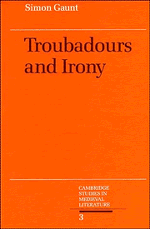Summary
It has become fashionable to discuss irony in medieval literature, but this is not simply a reflection of modern preoccupations. The word eironeia is first used in Plato's Republic; throughout the Middle Ages we find ironia discussed in rhetorical manuals; Erasmus wrote that he disliked extravagant praise because it was akin to ironia; and Balzac warns his readers against misunderstanding quelque ironie in his work. Irony, it would appear, rears its head throughout the entire tradition of European literature and thought.
If irony in medieval literature has proved a particularly popular subject in recent years, this is perhaps because critics in the past have tended to assume that medieval authors were unlikely to be ironic. Such a unilateral approach to medieval literature led scholars such as Peter Haidu and Dennis Green to devote studies to irony in the medieval romance and Green concluded ‘courtly literature, and with it the romance, shows a predisposition towards the critical, and therefore towards irony and parody from the beginning’. The view that courtly romance is often permeated with irony, though still controversial, is now widely held and it is thus all the more surprising that irony in the medieval lyric should have attracted so little attention.
Indeed, although he allows for the possibility of irony in the lyric, Green suggests that irony is less likely in lyric poetry than in narrative texts, and in this he reflects the view of D. C. Muecke, that on the whole lyric poetry is not a form of writing that lends itself to irony. Are they right to see the lyric as a genre which is generally not ironic, or should we perhaps reconsider such texts?
- Type
- Chapter
- Information
- Troubadours and Irony , pp. 1 - 4Publisher: Cambridge University PressPrint publication year: 1989



